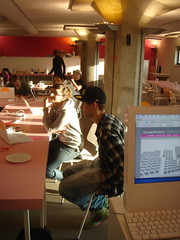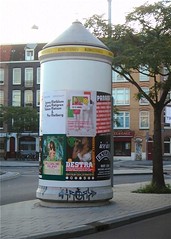Friday, June 05, 2009
It Doesn´t Take A School
I was playing with these gigantic soft building blocks with my 3-year-old nephew when this approximately 5-year-old kid turned up - with his Mom. He started ripping toys from my nephew, got intentionally on his way in the slide and spent most of his time just beating stuff up.
I gave him nasty looks so he understood to move away but he kept testing the limits. The mother was standing next to this kid, checking her mobile and flicking through the photos on the digital camera. The kid kept running around, jumping recklessly on the pillows and destroying the constructions built by others. The mother witnessed the situation but did not act upon it. The kid had a similar look in his eyes as the jerk sergeants during my military service. He knew he was feared - and was loving it.
I can´t see into this mother´s head. But I can´t accept her actions. Maybe she was just glad of her child not being the "weak" one being bullied. But without intervening she was teaching her son that this kind of action is OK with strangers. She was teaching her son that this is how you get things through.
The situation made me sick and I lured my nephew out of the room with the power of ice cream. The mother was upholding the "boys are boys"/"real men" attitude, which prevents boys from going to hobbies such as dancing, makes them scared of showing weakness or sadness and locks them up in tightly framed expectations where violence is the only allowed method of proving your masculinity.
Monday, May 25, 2009
StrangerFestival 2009 is looking for video artists and professionals to conduct video workshops!

StrangerFestival is an international festival for young videomakers & fans and is an initiative of the European Cultural Foundation. In collaboration with our partners we will organize video workshops in more than 15 countries for young people in summer 2009. Do you wanna come and help us out?
For the StrangerAcademy we are looking for video artists and professionals who can come up with a concept and conduct one of the 3-day video workshops or want to be a professional in the LAB assisting the advanced participants in realising their assignment.
An important part of StrangerFestival is the website, www.strangerfestival.com, which is a living archive of videos sent in to our competition.
From 14-17 October 2009 StrangerFestival will take place in Amsterdam in Studio K, consisting of the 3-day StrangerAcademy for creative young video makers (14-16 October), the StrangerExpert meeting for professionals in the field of media and youth (16 October) and the StrangerAward Ceremony and closing party (17 October). Young video makers and professionals from all over Europe and beyond will get together during these days and participate in the workshops and expert meetings offered during the event.
StrangerAcademy will be a place where more than a hundred and fifty young video makers between 15-25 years old from all over Europe can develop their video making skills.
The StrangerAcademy will be divided into two levels: beginners and advanced. For beginners we will offer several 3-day workshops where the planning is set from beginning to end so the participants have a fixed schedule where they are guided step by step making sure they create new work, learn the basics of video making and get the opportunity to work closely with each other.
For the advanced participants the approach will be different. We will create a LAB, a creative space, where technical equipment, professionals in editing, filming, sound, concept building etc. are present to assist the participants in making their video. Certain renowned organisations will give these participants the assignment to make a video for the company which the participants need to finish within the three days.
If you are interested in conducting a workshop keep this in mind when writing your application:
• The budget for this year’s StrangerFestival is very limited.
• ECF will take care of all technical equipment and workshop space
• 3 facilitators per workshop, ECF is in a favour of workshops with a peer to peer education element
• The workshop should be easy to follow for people who do not speak English very well
• The workshop can be on any video genre (documentary, animation etc) • Workshop focus should be on skills development and collaboration between participants
• Topics should relate to StrangerFestival competition categories: about me, creative/arts, change the world.
• Results should be: new content (videos between 1-5 minutes) per participant or per team
If you are interested in being one of the professionals in the LAB this is the sort of profile we are looking for:
• (Artistic) video education background
• Good working knowledge of cameras and editing programmes
• Good knowledge of English
• Good communication skills
• Ability to work under pressure
• Flexible and willing to improvise
• Capacity and commitment to work with youngsters on an equal basis
• Sensibility to respect various cultures and group processes
If you are a workshop organiser yourself or if you know people who might be interested in this call, please forward the message. If you wish to join in, you can ask for the application form from Giusy Chierchia at gchierchia (at) eurocult.org.
Wednesday, May 13, 2009
10 Second Johnny
This guy on the video, Johnnydurham19, is coming in a couple of weeks to a video culture symposium at the University of Arts and Design. I will be moderating a session there - with Johnny and others - on why non-professionals make and watch videos. Should be fun. Thursday 28 May at the University of Arts and Design Helsinki.
Wednesday, April 15, 2009
Made It To The Cover
Archis Foundation, Amsterdam
AMO, Rotterdam
C-LAB, Columbia University New York
First time I made it to a cover of a magazine. Here´s a teaser on the article:
"Several youth cultures show how difference can be a prerequisite rather than an obstacle to interaction. By giving serious attention to interaction practices in transnational youth cultures we could actually find answers to many of the diversity problems with which Europe currently struggles."
Volume can be bought from selected bookstores:
Amazon
NAI Publishers
Bruil
Archis
Monday, April 13, 2009
Real TV

Some people use Easter for quieting down - I did not. In the midst of Bree van de Kamp -like cooking and baking (muffins and what have you), I managed to accidentally bump into an episode of Skins on SubTV. I had forgotten how bloody brilliant this Channel4 teenage drama actually is. Thank you, Sub, for the reruns.
Skins is amazing and quite unique as its handles teenage angst and torment in full honesty and without irony. It reminds everyone what kind of an emotional rollercoaster it is being young and there is often very little the parents can do. It reminds one of the importance of handling the emotions of teenagers with care but also shows how smart they already are. Not a kid, not an adult - Skins captures well that tripping in and out of adulthood.
Here´s a clip (Channel4/YouTube apparently does not allow embedding)from this Friday´s episode where the class practices Osama - The Musical. It shows well how frank Skins is - maybe too frank for some. The writing of this programme is quite amazing. As it was pointed out to me while watching, could you think of a US series where teenagers sing:"Then came the day Osama blew us away and now I know how I feel."
Monday, March 23, 2009
Who Wants To Be A Journalist
I have been mongering (is that a word) about the state of media education for ages. I feel that it more than often focuses on protecting young people from "the media", treats children and teenagers and imbeciles, forgets the role of amateurs in creating media content and forgets notions of critical reading. Good description of the current debate here. For all this, it was great to visit Piste and see that someone knows how to do it.
Sanoma Corporation has build a sort of a mini-Helsinki into the basement of its headquarters. The participants are divided to teams with some of them working for the quality daily Helsingin Sanomat and some for the tabloid Ilta-Sanomat. They all get mobiles, maps and guidance from an editor. All teams working on the same story and in the end they need to decide within their team on the angle of the story, on the headline and the photo.
Piste emphasises the key things in journalism:
- that good journalism requires dedication, persistence and investigation. You need to keep calling people, checking information given to you and making sure that you make good notes.
- it shows the essence of team work and clear division of tasks.
- it strengthens understanding that journalism is very much also about choices in terms of angle. That even if you have the same information, the story is different in Ilta-Sanomat and Helsingin Sanomat. Piste also demonstrates well how different the story seems with a different headline.
The great thing is also that the groups are led by real journalists who can through their own work show what all these issues mean in real life. I am sure this makes the visiting teenagers listen much more carefully. Our guide for instance was telling how you need to constantly make choices for instance around the school shootings on when to publish the name of the shooter or a certain photo. She also shed some light on the collaboration with the police and fire department.
I would be surprised if someone after Piste would not want to become a journalist. Piste demonstrates superbly how fascinating the job really is and how top quality media education really is done.
Friday, March 20, 2009
StrangerFestival Is About This
So, my former colleagues had put a clip from the StrangerFestival DVD online. I actually like how in this interview the background thinking of the project comes across.
And yes, someone should have told me to control those hands while I speak....I know, I know.
You can order your own copy of the DVD with this interview and much more from stranger (a) eurocult.org.
Tuesday, March 10, 2009
Monday, March 02, 2009
Tuesday, February 03, 2009
Project North
And hey, the movie is distributed free of charge. Download it here.
Sunday, December 14, 2008
Coolest Damn Video Festival on the Planet
We started StrangerFestival around two years ago on a couple of PowerPoint slides. Along the way came the visuals, the partner organisations, first videos uploaded on the site, first marketing material, more partners, more videos, an international festival and loads more. It is already a great project which has given loads of people their first time on a plane, their first video-making experience and their first international friendship.
This weekend we had a meeting first with our European partners and continued right away with the first meeting of TheStrangers, a group of young video makers acting as our expert group. Both of these meetings made it clear: this project belongs now to more people. It is not just our project. It is a bloody fab feeling when you start hearing more and more people using the word ´we´.
I am happy I get to continue in the project also next year, although in another role. Having these meetings in the beginning of the year would have made sense but then again TheStrangers group was really possible only after the first entries. It is fantastic that we can now learn from 2008 and make things better in 2009.
The people and issues we work with are amazing. Just a testing session on the website generated already a list of small things that would help make joining easier. You get to see some of them in the coming months. We came up with ideas for great workshops, created new categories, wrote down lists of possible jury members, brainstormed on prizes and even made some videos. TheStrangers showed us in the team and to each other already several videos which we had not seen before but which were winning material. It has now been proved that having young video makers owning the project with the team brings in great content. It is therefore clear now that in 2009 StrangerFestival will be even more special, even more fun and even more meaningful. I cannot wait.
Here are some of their findings:
Beautiful childhood memory from Slovakia
Role of video making in one´s life
How making a video important to you always does not need to be about you
Tuesday, October 14, 2008
Tuesday, October 07, 2008
We The Republic
And all this with just a click - for free. And we even got into The Guardian.
Wednesday, October 01, 2008
The Video Republic
On Monday we launch together with Demos a report on youth and video which has been carried out associated to StrangerFestival. From Monday 6 October the report is available for downloading at www.demos.co.uk. I highly recommend reading it. But here as a taster, a video building up the excitement. The report is funded by Helsingin Sanomat Foundation.
Tuesday, September 30, 2008
Kid, Young, Youngish, Aging
Next to the few jokes made about the age issue, for a moment it threw me off rails. To be exact, my own surprised reaction was more troubling than the age difference. What’s in an age?
I have often been in situations where I am the youngest person and I have found people addressing me in a highly condescending manner. I could list numerous examples where I have got upset by comments such as “oh, you will understand when you are my age’ or ‘you young people’. I just have zero tolerance towards using age difference as a lifeline out of a professional debate. But the dinner last week made me wonder whether I have now gone full circle and started addressing people in a manner that I would not tolerate for a second. Why on earth would it change my approach that there is seven years between me and a colleague?
Due to my work I use the phrase young people several times a day. I use it in discussions, advocacy work, articles and funding applications. But I sincerely hope that last week, I catched myself early enough. I do not want to be that person who looks down on young people with that irritating amusement on their face. I really wish I can be a person who listens without prejudice, who makes judgements based on arguments and who is willing to explain their position to both young and old.
But I also want to recognize that I am getting older. I acknowledge that there are things that just go beyond my taste, my judgement and my understanding. But I wish I can live up to Robert Kennedy’s notion of qualities of youth: "not a time of life but a state of mind, a temper of the will, a quality of the imagination, a predominance of courage over timidity, of the appetite for adventure over the love of ease."
Wednesday, September 17, 2008
Switch
---
During my summer holiday I read a great book by a Finnish young philosopher called Tommi Uschanov. The pamphlet by this quite peculiar character is called What is the matter with the Left. In this book that he had apparently been working on for more than six years he wondered why the European left is doing so badly when most of us buy their values of solidarity and compassion nearly to the full. What Uschanov wrote about the Left’s thinking I feel links well to the subject of this intervention. Uschanov claimed that an overall problem of European social democracy has been to tell people that their understanding of themselves and their priorities is wrong and that only if they would understand that they live on false premises, the society would function better. This was very visible in the 1970s idea in the Nordic countries that there is a Social Democrat in all of us.
In my work with young people – once again I wish to stress that I am not part of this group – I meet engaged and worried young people. These people are busy with a million things at the same time on a personal and local scale. The young video makers and fashion designers I meet also seem to be extremely allergic to fake things. If I was asked to describe the generation just shortly, I would dare to state that their jargon tolerance is the lowest of all generations I know. I see people driven by real emotions, real actions and real skills, not by big ideas, great achievements and global movements.
I think this is where it somewhat goes wrong for Europe. When a generation of personal action is coupled with ambitious ideologies, they detach from each other quickly like oil and water. The message being pushed is about big things such as peace and prosperity where people want a role, they want a genuine feeling and they want an emotion. The question I hear is: what should I do with Europe and what does Europe expect me to do? I really don’t have a compelling answer based on the current paradigms.
In the videos I see online on our projects but also on platforms like YouTube, the majority of the videos are not making explicit statements about the state of the world. They are more saying “this is how I think I am feeling today” or “this is what I think matters to me today”. As a research commissioned by the ECF around the StrangerFestival points out, young people use video for deliberation and they very seldom make their work for a specific audience. Video is in most cases a public tool for self exploration.
A superstructure like Europe is not an issue tackled often when it is nothing you can touch, nothing you can strive for and nothing you can influence in your daily practice. Just as an example we can take last year when the European Union celebrated the 50th anniversary of the Treaty of Rome. The message put forward was 50 years of peace. A lot of references were made also to the fall of the Berlin Wall and the progress Europe have made since then. I could not help wondering what this all should mean for an 18-year-old today who was minus 32 when the treaty of Rome was signed and just about born when the wall was hammered down. 50 years of peace and now what? When Europe seems to be a deteriorating mega project, it is very difficult to get excited.
Coming back to Uschanov, I feel we need a switch in our thinking. Young people are not stupid and don’t buy Europe when you attach a popstar to it. Europe needs to be demystified and it needs to start from people’s realities. What this video culture offers us, is this pool of deliberations for us to dive into. Now what we are mostly doing is asking them to adjust their reality to a supersystem without no practical implications.
So what could be done? I would have two suggestions:
1. Provide access for more young people. If we want to see a Europe that goes to the skin and feels like something, we need to make sure that more people are involved. With this I mean work that we do for instance with theoneminutesjr by providing access to culture, supporting self-esteem to enter the public sphere and in that sense tackling the symbolic inequality in the public sphere created mostly by white heterosexual men. But we need to allow people to decide what matters to them, which brings me to my second point.
2. And this is more difficult: We need to support connections and curation and help people – both young and old – to make sense and find their place. We need to build links between strangers but on matters that matter to them. This does not mean that people need to agree but we need to work towards exposing commonalities in interest. We need to allow people – young and old - to test, modify and attach rather than buy a message about a superproject. When you start from something that matters to the people, you are already more than half way there. And when these millions of expressive people with millions of aspirations happen to be in Lisbon, Pieksämäki and Cluj, I bet there is a feeling of being part of something bigger than our own village. I really think free self-expression is the key: if I matter to Europe, Europe could matter to me.
Saturday, July 05, 2008
Sunday, June 29, 2008
Who's An Expert?
A weekend nearly free of StrangerFestival is about to end. It was needed as now I am again superexcited about the fact that the festival starts on Wednesday with 200 people flying in. I saw some of our posters again in the city and I had the "oh me god, that is me project" (sorry for those who do not appreciate the attempt to imitate an English accent there).
One of the most exciting things is flying in cool people to run workshops. Nerimon, a British blogger, is one of them. He and Katers17 will run two workshops on video blogging. Here's my favourite post from Nerimon. I am also extremely excited about Eboman performing at the opening.
Tuesday, June 17, 2008
Tale of Two Worlds
1. Exhausting, budgets, deadlines, Excel, "do we have this money or not", "this registration of hundreds of people really takes a lot of time". "I thought you were doing this", "shouldn´t we leave the office, it is like eight in the evening".
2. "I saw them, I saw them, I saw them on my way to work! The posters are everywhere! Can we just leave the office and go and take pictures of all StrangerFestival posters in Amsterdam!?", "I love these AudienceAward final videos! I can watch some of these like gazillion times.", "Yes, the Congolese video makers are coming!", "This MC performance will be sooooo cool!"
"So, are you ready to lock your options?"
"Yes, I think I will go for two."
"No hesitation there? Would you like to call someone or ask the audience?"
"No, let´s go for two."
Sunday, June 08, 2008
Can You Read This?
Last week I made a phone call to Finland at the office and my colleague said that she recognises Finnish as it is one of the only languages she cannot place. So when she does not have any sense at all, she assumes it is Finnish. In the same sense I can't tell you how many times someone has pondered over the difficulty level of Finnish or the impossibility for a foreigner to learn it. "Finnish, it is such a difficult language, right?"
Well, no way, Jose. This weekend's Observer has a big piece on how children in the UK need internationally compared longer time to learn how to write and read as English is so without logic. Masha Bell's report The Most Costly English Spellings points out examples and lists of words that kids find difficult. Such as:
- When 'clean' and 'gene' sound same, why do you write them differently?
- How about 'kite' and 'light'?
- Why do you pronounce 'ei' differently in 'eight' and 'height"?
- Why is their a letter 'i' in 'friend'?
And listen to this, Anglophones:
"In Finland, where words are more likely to be pronounced as they look, children learn to read fluently within three months. In the UK, academics have found that it takes three years for a child to acquire a basic level of competence."
- The Observer 8 June 2008





















